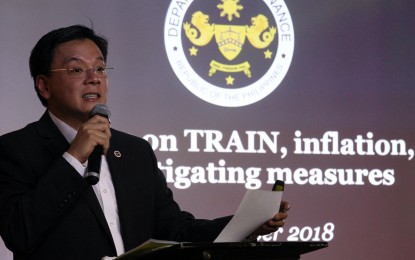
INFLATION 101. Department of Finance (DOF) Assistant Secretary Tony Lambino explains the factors affecting inflation and its impact to the country's economy during the launch of "The Presser" at the ASEAN Theater, Philippine Information Agency (PIA) in Quezon City on Monday (Sept. 10, 2018). (PNA photo by Oliver Marquez)
MANILA -- Finance Assistant Secretary Tony Lambino clarified that only about 20 percent of the increase in local pump prices can be attributed to Tax Reform for Acceleration and Inclusion (TRAIN) Law.
In his presentation during the launch of the Presidential Communications Operations Office (PCOO) program called “The Presser” at the PIA Auditorium Monday, Lambino disclosed that of the PHP11.4 per liter increase in the price of diesel to date, only PHP2.8 or around 25 percent is due to TRAIN.
For gasoline, TRAIN’s contribution is about 30 percent or PHP3 for the total increase of Php9.89 per liter.
As of last August, price of oil in the international market has risen to around USD71.9 per barrel.
Lambino pointed out that on top of the impact of world oil prices, weakening of the peso against the US dollar has contributory impact on higher domestic oil prices.
He explained that when the first tax reform package was filed in Congress in January 2017, the price of oil is around USD53.37 per barrel and the peso was trading at about 49.74 to a greenback.
When the House of Representatives passed TRAIN in May 2017, the price of oil in the international market declined to around USD49.91 per barrel but the local currency has depreciated a bit and was trading at around 49.86 to a dollar.
When the measure was signed into law in December 2017, price of oil rose to around USD60.91 per barrel and the peso is trading at around 50.30 to a dollar.
To date, price of oil in the world market is around USD71.90 per barrel and the peso is trading at around 53.30 to a US currency.
Lambino noted that it is not just the Philippine economic authorities who did not foresee these oil price adjustments but some international organizations as well.
He also pointed out that the increase in domestic oil prices as a result of TRAIN is progressive and this measure is targeted for the wealthy “because 10 percent of the richest households consume 50 percent of petroleum products in our country and the top 20 percent richest households consume 70 percent of petroleum products in our country.”
“So, we are asking those who have more -- may mga pribadong sasakyan (those who have private cars) -- to contribute more to national development,” he said without elaborating.
Lambino said TRAIN’s contribution to the 6.4 percent inflation in August 2018 is only around 0.4 percentage points.
“Essentially, for every PHP100 in additional spending, PHP6 is coming from TRAIN,” he said.
“So, again, for those who are calling for the suspension of the oil excise, we must understand that it will lower the price by a little bit but probably not by as much as most people think -- around 20 percent of the price increase,” he said.
Lambino also clarified that the “gas and other fuels”, which is part of the Housing, Water, Electricity and Gas and Other Fuels index of the inflation, as reported by the Philippine Statistics Authority (PSA), pertains to household gas like kerosene and liquified petroleum gas (LPG), not gasoline and diesel. (PNA)
